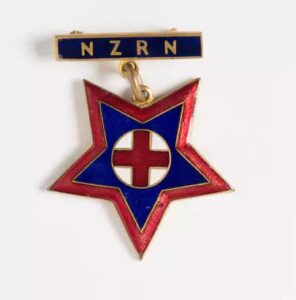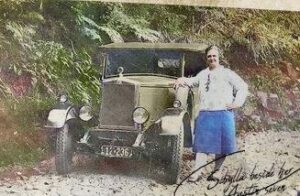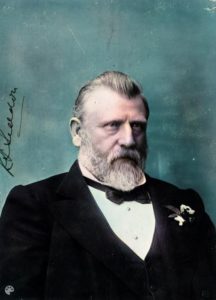1901: Nationalised Nurses
September 12, 2023
By AHNZ
 Today in history, 12 September, 1901, New Zealand nationalised nurses. We were the first country in the world to have The State take control of nursing. Naturally, we congratulated ourselves for being so Progressive and State History never looks back on the glorious Anarchy that once existed in the more free health system New Zealand had before. The Nurses Registration Act took effect on 1 January, 1902.
Today in history, 12 September, 1901, New Zealand nationalised nurses. We were the first country in the world to have The State take control of nursing. Naturally, we congratulated ourselves for being so Progressive and State History never looks back on the glorious Anarchy that once existed in the more free health system New Zealand had before. The Nurses Registration Act took effect on 1 January, 1902.
This was ‘Boer War Honour Culture’ times. We were quite authoritarian, quite militant. Compulsory military training and buying battleships for Britain happened in the same era. Even the popular religion of the time called itself an ‘army’¹ and gave its members ranks! Socialist nursing came out of the Boer War. It would take another war, WW2, before doctors were also socialised in this country. And they didn’t even get a little badge for complying. Ref. 1938: The Social Security Act, AHNZ
‘Nurse’ became a legally protected title like so many other concepts ‘copyrighted’ by The State so that only Official Persons could control who could or could not use particular names. They will only do this because there is money and power involved in terminology that already has recognised currency before Government came along to take over. For example, the word ‘ANZAC’ was ‘trademarked’ by The State in 1920. Or, think of how the government’s registered gang is the only one that can dress the way it does or call itself “The Police.” If you do what they do it’s “kidnapping” or “theft” because they have copyright protection over “arrest” and “fine.” The State has also put copyright protection on diseases like “cancer,” “diabetes,” “asthma,” etc. so that only approved of people can claim to be able to treat these things and the rest of us go to jail. On the other hand, we can speak of blood, lungs, and cells because the government does not “own” those ideas. So much for free speech!
The Act did allow for nursing outside of government control but branded any such practitioners “unregistered nurses” which is a real career killer. If an “unregistered nurse” did something wrong then the newspapers made sure to publicise her unofficial status to drive home the ignominy of daring to exist off the government’s books.
Section 12 directed all hospitals and institutions to give preferred status to their registered government nurses when hiring. In these ways, despite the Liberals promising that registration was optional and voluntary they really had it locked down. Typical politicians telling lies but it worked. Somehow the many existing nursing nuns and charitable institutions put up no fight and allowed their industry to be put under Big Brother’s thumb.
“the Nurses Registration Act 1901 was passed, and provided for a course of three years’ training and a State examination followed by registration. This was a revolutionary achievement,..” – An Encyclopaedia of New Zealand, Alexander McLintock (1966)
“The Hon. Hall-Jones, in -replying, thanked the members for the favourable reception the Bill had met with. It was not compulsory for anyone to register under the Bill, which was of an optional character. If private hospitals came under Government control and were otherwise suitable, he would have no objection to their coming within the scope of the Bill.” – Wanganui Herald (August, 1901,) Papers Past
“In New Zealand, however, state registered nurses came into being with relatively little debate, either publicly or in parliament…No dissenting voices were heard in the letters columns. Only a few members of parliament spoke against the bill during the brief debate on it.” – Sargison thesis (2010)
The idea of ‘nurse’ had been trending since Florence Nightingale achieved celebrity status and politicians wanted to copyright it. The currency became acute when a generation of Western Women came of age who had admired and aspired to be like Nightingale all their lives. Thus, Premier Richard Seddon set the scheme in place to effectively nationalise the industry by deploying one of his powerful Wellington bureaucrats named Grace Neill. This Liberal flunky had an axe to grind about health so Seddon let her go at it by bringing nursing and later midwives under government control. The fiery red-head Neill even designed the NZRN 5-point star badge and gave herself the very first with a #1 on it to show she was First Nurse. Seddon’s flying monkey henchwoman even buttered the Premier up by naming her State midwife schools ‘St Helens’ after his birthplace and ‘Richard Seddon’ was given as the name for the first baby born in one. However, when the old man died her political career in New Zealand was buried with him.
 Fact is, New Zealand already had highly respected women who were nurses. For example, Sybilla Maude, in Christchurch, and Selina Sutherland, in Wellington, and Suzanne Aubert at Whanganui were well away and celebrated long before the Government stepped in to regulate them.
Fact is, New Zealand already had highly respected women who were nurses. For example, Sybilla Maude, in Christchurch, and Selina Sutherland, in Wellington, and Suzanne Aubert at Whanganui were well away and celebrated long before the Government stepped in to regulate them.
Likewise, New Zealand was doing just fine with self-regulation of nurses. In Christchurch the St John Association created a nurses register in 1882, Auckland doctors had one in 1891, Dunedin in 1895. To get on one of these registers required scrutiny and there was no way to stay on it without bringing the list and everyone on it into disrepute so those on the list had to be good at their jobs. If clients did not want to engage a nurse from this register they didn’t have to do it. This perfectly good voluntary system was a bit like the forgotten social welfare system we had before The State went into competition with it and then had their competition abolished! Ref. 1842: Manchester Unity, AHNZ
The Seddon-Neill scheme created a supply-side crisis in New Zealand nursing that has never abated since. They’re still over-worked and under-paid due to the socialist system these Liberals put in place.
A would-be nurse had to have three years of practical and theoretical training in a hospital before they could sit the state registration examination. And, they couldn’t do this until they were 23 years old! A woman could get married at 18 or even train to be a doctor and start practicing by the age of 21 but she could not be a nurse until reaching the age of at least 23! This situation did not change until 1921. But, of course, understanding of the economic marketplace was no business of people like Seddon and Neill.
 Naturally this created a shortage of nurses in our hospitals where, to this day, leakages occur into the private sector and to other jurisdictions where a nurse can be fairly paid for her expertise.
Naturally this created a shortage of nurses in our hospitals where, to this day, leakages occur into the private sector and to other jurisdictions where a nurse can be fairly paid for her expertise.
When the government-sanctified hospital boards realised the effects of the crisis they had been a party to creating they tampered even more with the market. They simply demanded that trainee nurses would be bonded for an extra year beyond the 3-year training course. That way they secured a stream of trained nurses whose salaries were artificially suppressed at about the same as a trainee! Conniving this in 1907 the North Canterbury Hospital Board noted that the penalty year would financially hurt their nurses and might not do anything for improving their skills but “it would certainly be in the interests of the hospital”. Ref. Sargison thesis (2010)
Socialism not only crippled the nursing industry just about as soon as it met its stride in this country but it hurt nurses too. They’ve never had a fair deal as a profession under this Edwardian socialist superstructure despite New Zealand’s health system depending on good nurses. What they lack in respect and fair pay is made up for by the exploitation of the desire to be of service. Generations of women are born with a strong drive to be important, valuable, authoritative, supportive, healing, caring, and superior. Being a nurse has a strong social cache and one can convincingly tell oneself and others that they are doing important work. Their jobs tell them they matter which might be a question they needed an external answer to. After all, aren’t they there when people die or are born or when they are at their most desperate? Aren’t most of the TV dramas based around hospitals for a reason? The drama, the importance, and the vehicle for dispensing care for others are powerful drugs that compensate for decent pay or reasonable working hours. Paradoxically, but typically, nurses believe that Government control has made their industry better rather than worse. The huge systemic problems caused by Seddon’s ghost haunting the industry are not correctly attributed to government intervention. Instead, nurses tend to demand more of what caused the entire problem in the first place!
—
1 Salvation Army
Image ref. NZ Registered Nurse 5 star badge first issued in 1901; Auckland Museum
Image ref. Nurse Sybilla Maude with her Austin Seven. Nurse Maude.org.nz
Ref. “ESSENTIALLY A WOMAN’S WORK”: A HISTORY OF GENERAL NURSING IN NEW ZEALAND, 1830-1930. Patricia Ann Sargison thesis, University of Otago (2010)
2 thoughts on "1901: Nationalised Nurses"
Leave a Reply
 Like Comment Share
Like Comment Share






Some of us have found out the States meaning of “optional”. Compulsory triggers rebellion but optional triggered very little debate, as usual the public [me too] are easily fooled.Thanks for removing my blinkers.
Appreciate your comments too.
The State is like an abusive husband. He’s got money. Fame. A house. Car. And you want to stay with him for the kids and your circle of friends. The abused will try to find a way to rationalise going back even when they have been hurt. They want to believe the relationship is “optional” so are very ready to believe those lies. Things will be different now. He’s changed. Around we go again…another Chris, same relationship.